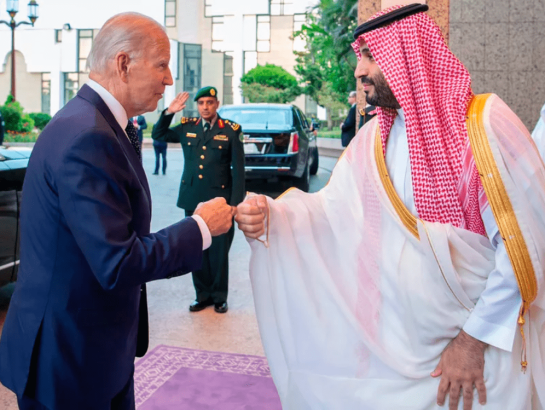In comments this week, President Joe Biden discussed the possibility of normalisation between Israel and Saudi Arabia. While suggesting that it remained ‘a long way off’ the Administration is seeking foreign policy wins before its diplomatic capacity is subsumed by the presidential election cycle. Though much of its focus remains on a Russian-Ukrainian war with no end in sight, it has turned its attention to the Middle East. Recognising both that the region is changing, possibly dramatically, and that a new era of global multi-polarity is approaching, the US eyes progress on the Iranian and Saudi fronts – both with profound implications for Israel. This BICOM paper assesses US motivations, the Saudi price for normalisation, and Israeli calculations.
The Israel-Saudi status quo
While Israel and Saudi Arabia do not enjoy formal diplomatic ties, informal and clandestine cooperation has been deep and mutually beneficial for some time. Relations took on a more direct, though still covert, character during the Obama years, with the two countries united by a shared suspicion of the US administration’s signing of the JCPOA with Iran, the Islamic Republic’s increased involvement in the region via its proxies, and the administration’s perceived pivot away from the region.
The two countries collaborate, quietly, on issues of security and intelligence– as well as business and infrastructure. Since 2021, reports have suggested that Israel and Saudi have discussed cooperating on regional anti-missile systems, which would remain relevant whatever the outcome of the Iranian nuclear programme. The Saudis also invested around $2 Billion in Jared Kushner’s sovereign wealth fund, which in turn invested significantly in Israeli tech startups. A New York Times investigation revealed that Saudi Arabia was a client of Pegasus, a spyware developed by the Israeli cyber-arms company NSO.
Saudi Arabia’s blessing for the Abraham Accords signalled a further warming of the relationship. While Saudi Arabia was not an active partner in the normalisation agreements between Israel and the UAE, Bahrain and Morocco, the agreements could not have happened without Saudi consent. Following the agreement, the Kingdom allowed airlines, including Israeli carriers, to overfly its territory on flights to and from the UAE and Bahrain. An additional step towards normalisation was Riyadh’s 2022 easing flyover restrictions for Israeli commercial aircraft travelling to China and India – personally authorised by Saudi Crown Prince Mohammed Bin Salman. According to media reports, Israeli Prime Minister Benjamin Netanyahu met secretly with MBS as well as US Secretary of State Mike Pompeo in Neom along Saudi Arabia’s Red Sea Coast in November 2020.
The view from Washington
The Biden Administration foreign policy priorities remain China and Russia, and the invasion of Ukraine consumes a substantial amount of congressional funding and political capital. Yet the administration is keen to convey that the drawdown of American “boots on the ground” in the Middle East signals neither a retreat from the region nor a decline in its influence. Moreover, part of meeting the Chinese challenge demands continuing to rival the growth of Beijing’s influence in the Middle East – demonstrated most recently by the Chinese-brokered normalisation agreement between Iran and Saudi Arabia.
This agreement also seemed to blur the binary Middle Eastern distinction between an Iranian axis – including proxies in Iraq, Syria, Lebanon and Yemen – versus a ‘pragmatic’ Sunni camp – including Saudi Arabia, Egypt, Jordan and some Gulf states. Nor were the fruits of the agreement long in coming. In May 2023, Syrian President Bashar al-Assad – a close Iranian ally – was welcomed back into an Arab League meeting in Jeddah after more than a decade of isolation. A month later, the Iranian Embassy in Riyadh was reopened, seven years after diplomatic relations had been broken off. In this context, the Biden Administration seems to be promoting two main regional goals: rebuilding close relations with Saudi Arabia, including advancing Israeli-Saudi normalisation; and deconflicting relations with Iran, which continues its charge towards becoming a nuclear threshold state.
Deconfliction with Iran
The Biden Administration is reportedly pursuing a renewed nuclear understanding agreement with Iran. Biden believes the Trump Administration’s withdrawal from the 2015 Joint Comprehensive Plan of Action (JCPOA) and the imposition of fresh sanctions prevented neither Iranian nuclear progress nor the growth of an Iranian-Russian axis which has made a significant impact on Russia’s war in Ukraine. With Iran approaching the status of a nuclear threshold state, a return to the original JCPOA eight years on is no longer possible. A ‘longer and stronger’ deal meanwhile is considered unachievable. In light of this, the administration sees the best path as reaching understandings to deconflict the situation.
American and Iranian teams met in Oman in May for the first time in several months as confirmed by Iranian Foreign Ministry spokesperson Nasser Kanaani. Those talks came as the International Atomic Energy Agency (IAEA) announced the closing of two investigations into a suspected undeclared nuclear site at Marivan and the apparent discovery of traces of uranium enriched up to 83.7 per cent purity at the underground Fordow site.
Talks reportedly revolve around the concept of ‘Less for Less’ in which sanctions relief would be offered in exchange for Tehran freezing parts of its nuclear programme. Under such a model, Iran would commit to halting enriching uranium at 60 per cent purity, (rather than continuing towards weapons-grade 90 per cent); renew cooperation with IAEA inspections; reduce Iranian support for Russia’s war in Ukraine; and pledge that Iranian proxies would cease attacks on US personnel in Iraq and Syria. In return, Washington would agree to the partial easing of sanctions and the unfreezing of oil revenues. A prisoner exchange is also being discussed.
Promoting relations with Saudi Arabia & Israeli-Saudi normalisation
As presidential candidate, Biden promised to make Saudi a “pariah” state over the brutal assassination of Washington Post columnist Jamal Khashoggi. As Israeli analyst Nahum Barnea put it, in the wake of the assassination, the Saudi Crown Prince, “Mohammed bin Salman (MBS), became the ruler most hated by the Democrats in Washington, on a par with Putin and Trump.”
Yet the Administration has softened its previously tough approach. Washington’s willingness to countenance warmer ties with Riyadh is recognition of the realities of an increasingly multi-polar global order and an attempt to keep the Kingdom within the US orbit.
The US increasingly considers Israeli-Saudi normalisation as “a declared national security interest of the United States” and has recently intensified dialogue. In May, National Security Adviser Jake Sullivan headed to Riyadh for talks with MBS. Secretary of State Antony Blinken paid his own visit in early June, at which the advancing of an Israel-Saudi deal was discussed. He was accompanied by the State Department’s senior Middle East diplomat Barbara Leaf, who in mid-June returned to the region, including a stop in Jerusalem for talks with Israeli officials. In parallel, US Middle East adviser Brett McGurk travelled for talks with MBS and other senior Saudi officials, including on normalisation.
One issue raised was direct flights for Israeli Muslims to visit Mecca. Following its 2022 easing of flyover restrictions for Israeli commercial aircraft traveling to China and India, it had been anticipated that Riyadh might signal the acceleration of the normalisation process by permitting direct flights to and from Israel in time for the annual Hajj (held this year between June 26-July 1). This would allow Israeli Muslim citizens to make the pilgrimage direct rather than via Jordan. However, although permission was granted by the Saudis, technical holdups meant that it was impossible to implement this year.
The price of normalisation
Saudi Arabia’s Chinese-brokered deal with Iran deal is not thought to have lessened the Kingdom’s appetite for normalisation with Israel. That deal signalled an attempt towards what David Ignatius in the Washington Post termed the Middle East’s “age of deconfliction”. Based on this, following a beleaguering multi-year proxy war in Yemen, a reduction in overt hostility with Iran was a pragmatic Saudi necessity rather than a signal of a fundamental shift in Saudi-Iranian relations. Indeed, MBS’s strategy is for deconfliction and closer ties with major powers across the board, including Israel.
In public, the Saudis continue to condition normalisation on the advancement of tangible steps towards an Israeli-Palestinian peace. “Israel has a lot of potential and normalisation can do wonders, not just for Israelis and Palestinians, but there’s potential for trade and cultural exchanges and exchanges with Israel on multiple fronts,” Fahad Nazer, spokesman for the Saudi Embassy in Washington said recently. “But for that to happen, for the kingdom to take that step, we need that core [Israeli-Palestinian] dispute to be resolved.”
The traditional obligations of Arab leadership common to the generation of MBS’s father King Salman conditioned Arab normalisation with Israel on peace with the Palestinians. The Abraham Accords broke that paradigm and proved that Israeli technology and advanced innovation were a more attractive prospect for the young Gulf elites, and it is thought that younger Saudi elite circles concur. Based on this reading, MBS’s programme of Saudi “modernisation” (a programme which critics are quick to point out does not include much in the way of an improvement in the Kingdom’s human rights) makes him unlikely to sacrifice a productive relationship on the altar of Palestinian solidarity. However, residual affinity to the Palestinian cause remains, and Saudi’s leadership status likely requires at least some Israeli gesture or declaration towards the Palestinians as part of a normalisation deal.
In any event, progress with the Palestinians remains a non-starter for the current Israeli coalition. The demand that normalisation be accompanied with concrete steps on the Palestinian front will be very difficult for Netanyahu to sell to a cabinet containing far-right cabinet members Smotrich and Ben Gvir. Similarly, a settlement freeze or public commitment to a Palestinian state along the ‘67 borders would seem highly unlikely.
The Saudis’ real price for normalisation seems primarily to be exacted from the US rather than Israel, and the list of its demands are varied and of profound consequence to the balance of Middle East power. Riyadh seeks an unprecedented defence pact with the US; the end of the freeze on US weapons sales initiated by the Biden administration; a package of advanced US weapons, including F35 combat aircraft; and acquiescence to its development of a civilian nuclear programme free from US or international control. MBS will also likely expect public recognition of his American rehabilitation from Washington.
MBS is also thought to want any deal with Israel not “merely” to be an extension of the Abraham Accords but something unique, reflecting the size and importance of the Kingdom.
US demands of Israel
One hope from Washington is that advancing potential normalisation with Saudi Arabia will constitute a sufficiently attractive carrot for Israel to maintain tacit cooperation over US policy towards Iran. Although Prime Minister Netanyahu has said that Israel reserves the right to defend itself, regardless of any agreement.
In any event, Washington will demand concessions from Jerusalem as the price of meeting the Saudi conditions for normalisation. Biden and the Democrat Party genuinely care about the Palestinian issue. Indeed, some suggest that the main driver of Saudi demands on the Palestinians might be the administration’s keenness to assuage a sceptical Congress currently unwilling to resume weapons sales to the Saudis with the carrot of Israeli commitments towards a two-state solution.
The Biden Administration is also likely to press the Israelis for judicial reform concessions as another price of facilitating normalisation. Public language from the White House has been untypically frank and critical on the package of reforms proposed by Justice Minister Levin.
What chance for normalisation?
Preparing for his ascension to the Saudi throne, MBS is pushing his country for a regional realignment. As such, he is eager to pursue normalised or closer ties with a variety of nations, Israel included, and his “Vision 2030” pictures a Saudi Arabia shifted dramatically from old paradigms. Despite the likely opposition of some conservative clerics and rival royal circles, he is thought to be bold and impetuous enough to pursue peace with Israel, and perhaps in a dramatic single step rather than through further incrementalism. Though he wishes to distinguish any deal from the Abraham Accords, the deals with the UAE, Bahrain, and Morocco have also set a precedent for normalisation deals with Israel (indeed ones without a concrete Palestinian element).
While the Saudi price for normalisation is clear, the US’s willingness to meet it is not. The volume and regularity of diplomatic visits, and the seniority of those involved, suggests at least an openness from Washington to consider Saudi requests. The Biden Administration is acutely aware that its window for securing a deal is relatively small (and narrows with each passing day). Once the President becomes entrapped in the reelection cycle, so delicate and substantial a diplomatic mission will be considerably harder to accomplish. Any deal in Biden’s first term would have to be secured by Spring 2024. The Democrats also recognise that were the Republicans to win the 2024 presidential election, they would have fewer qualms about giving the Saudis what they want, in the process guaranteeing their own foreign policy legacy.
Normalisation with Saudi Arabia has been a key Netanyahu priority for some time and Israel’s long-standing position is to be open to peace and normalisation with all states in the Arab world. Following on from the Abraham Accords, such a peace would he argues, “effectively end the Arab-Israeli conflict”. It remains to be seen whether Netanyahu will ultimately consider and be able to convince others that the prize of Saudi normalisation is worth the security and political costs demanded by the Americans and the Saudis.
Netanyahu would likely be open to the administration’s demand to slow down (or freeze) judicial reform. With the prime minister allegedly eager to find a route to a compromise on a softened package of reforms in any case, US demands of this as a price for Saudi normalisation might provide a useful justification for ignoring the wishes of his more hard-line cabinet colleagues.
The military and nuclear issues will be more challenging for Israel to agree to. Even if Israel grudgingly accepted the ‘less for less’ deal with Iran, acquiescing to Saudi demands would likely change the country’s strategic situation. The arms package demanded by the Saudis alone could substantively alter the regional balance of power. If the US agrees to maintain Israel’s Qualitative Military Edge, Israel could conceivably be compensated for the Saudi package by an increase in the capacity of its own conventional weaponry.
Traditionally, in keeping with the ‘Begin Doctrine’, Israel opposes the introduction of any nuclear programme in the region as a potential existential threat. A deal dependent on this Saudi demand therefore has Israeli critics. However, if the Saudis are adamant about pursuing a nuclear programme – which they could do with the assistance of Pakistan or China – then proponents of the agreement will argue that it is better for Israel to acquiesce and to reap the rewards of normalisation.



































